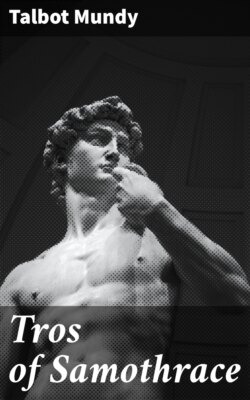Читать книгу Tros of Samothrace - Talbot Mundy - Страница 4
На сайте Литреса книга снята с продажи.
INTRODUCTORY
Talbot Mundy on Julius Caesar
and the Samothracian Mysteries
ОглавлениеTable of Contents
Arthur S. Hoffman, chief editor of Adventure from 1912 to 1927, wrote the following article for the magazine's "Camp Fire" section as an afterword to the first part of "Tros of Samothrace." The article contains, and is written around, a letter from Talbot Mundy in which the author describes his views of Julius Caesar as a man and a leader, and speculates on the nature of the Samothracian Mysteries.
Thanks and credit for making the text of this article available to RGL readers go to Matthew Whitehaven, who donated a copy from his personal archive for inclusion in this new edition of the book.
When Talbot Mundy first began talking to me about the Tros stories (there are to be others) and about Caesar and his times I began cussing myself for having done what I very particularly hold in contempt—I'd been swallowing whole some other fellow's collecting and interpretation of facts and the whole conception resulting therefrom. All of us are naturally inclined to do this; that is why our civilization shows so many stupidities. But a minority struggle against this lazy, sheep-like habit and try to think for themselves as best they can. I'd flattered myself I was among those who tried—and then Talbot Mundy came along and made me see what a stupid sheep I'd been.
Since school I haven't studied history (except for a few years that of ancient Ireland) or even done more than desultory reading—for example, learning from Hugh Pendexter's stories more than I'd ever known of the history of our own country, and from others of our fiction writers more of the history of various countries. I'd had to translate Caesar's Commentaries and to absorb more or less history as she is taught. It was impressed upon me that Caesar was a great man, an heroic figure. His Commentaries I accepted as true word for word. Did not other historians accept and build upon them? Were they not everywhere perpetuated in the schools without ever a question raised as to their complete trustworthiness.
In later years, of course, I learned that historians, instead of being infallible, were merely human beings grubbing among scattered bits of facts and trying to build out of them a complete conception of something on which they generally had no first hand information whatever. Also, that if one them made a mistake, many of those after him were likely to swallow the mistake and perpetuate it, and, on the other hand, that the historian of today, having at hand added bits of facts, is likely to consider the historian of yesterday very much out of date and not to be trusted too much in his deductions. In other words, any historian, including him of today, is, by the historian's own test, not a final authority but merely a more or less skilful guesser at the whole truth from what small bits of it he manages to collect.
Yet I had been swallowing whole, without question, all the historians had been handing me. To be sure, Shaw years ago had merrily slapped most of the historians in the face and presented a comparatively new conception of Julius Caesar, but by that time I'd reached the stage where I didn't accept other people's say-so so easily. Like a true sheep, I relapsed pretty well into my old conception of a very heroic Caesar and a very wonderful and rather admirable Roman Empire.
Then Mr.Mundy, after much delving into books, arose and challenged the whole works and I awoke to contempt for myself. I didn't mean I just scrapped all my old conceptions and accepted his, but I realized that I, at least, had nothing with which to support the old ideas against the new. Maybe Mr.Mundy is all or partly wrong. I don't know. Let's hear the other side in rebuttal. There are plenty of historians, both professional and amateur, among us who gather at Camp-Fire. Let's hear from them.
One thing seems clear to me. If historians have accepted the Commentaries as completely as Mr.Mundy says, then I'm "off them" and for the same reason as Mr.Mundy—I hesitate to swallow whole the account of himself and his doings that an ambitious man wrote or had written to be read by the voters and politicians he must win to him in order to realize his ambitions. Let's hear Mr.Mundy's case:
